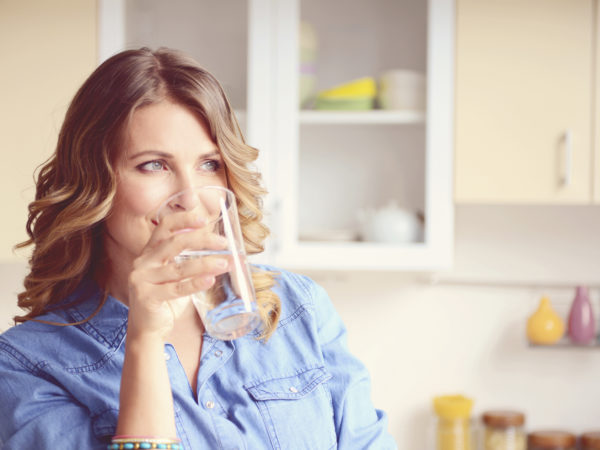A Cuppa Caffeine Instead of Water?
Can you get enough water from just drinking tea and coffee?
Andrew Weil, M.D. | April 25, 2002

Updated 4/01/2005
The short answer to your question is “no.” Thanks to their caffeine content, both tea and coffee are diuretics – that is, they cause the body to lose water. And you do need the water – when you don’t get enough, your cells start to draw water from the bloodstream. Blood gets sludgy, your heart must work harder, and your body starts to redirect blood away from less vital areas.
You don’t necessarily have to follow the standard recommendation to drink eight, 8-ounce glasses of water per day, but you do need to drink as much of that amount as you comfortably can and usually more than you think you need. This is especially important during and after exercise or during hot weather when you’ve been sweating. Try to drink extra water whenever you think of it – you’ll know you’re getting enough when you notice that you’re urinating more often than usual.
If you really don’t like drinking plain water, you can get the fluids you need from highly diluted fruit juice, herbal tea or a well-watered down sports drink. Avoid caffeine-containing colas – they have the same diuretic effect as coffee and tea.
To get two cups of water from coffee or tea, you would have to drink three cups. Considering that you should be getting eight cups of water per day, you would have to drink 12 cups of coffee or tea to get that much. You would be consuming much too much caffeine, more than enough to make you jumpy, anxious, fearful, and interfere with your relaxation, rest, and sleep. If you are drinking anywhere near that much coffee and tea, I strongly suggest that you cut back to no more than 300 mg of caffeine per day. (The amount you get from a single cup of coffee depends on brewing method – drip gives you between 88 and 280 mg while percolated contains between 27 and 64 mg; a cup of black tea gives you 45 to 75 mg of caffeine while green tea gives you 24 to 48 mg).
Caffeine is a strong stimulant and an addictive drug that can negatively impact your health by causing or worsening headaches, anxiety, insomnia, cardiac arrhythmia (palpitations), high blood pressure, gastrointestinal and urinary disorders, prostate trouble and PMS. In addition, studies have revealed unhealthy tendencies among people who consume large amounts of caffeine. For example, researchers have found that those who drink a lot of coffee often smoke cigarettes, get too little exercise and eat meals too high in fat.
If you decide to give up caffeine (which I recommend), set aside three days to go “cold turkey.” You’ll probably experience headaches and lack energy for the duration so don’t make plans for 48 to 72 hours. To cut back, gradually eliminate a cup per day until you are down to no more than 300 mg of caffeine.
Andrew Weil, M.D.









